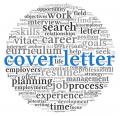Find out the full name of the person responsible for hiring paralegals, and direct your letter to that person by name. "Dear Sir or Madam" or "To whom it may concern" never impressed anyone. Make you're spelling the person's name correctly and that you have the right job title. Your resume will then be sent directly to that person's attention. If you bypass this step, your resume may take longer to reach the correct person, and it may not make it there at all.
HOT TIP: Call the law firm and ask the receptionist to whom paralegal resumes should be directed. Be extremely friendly to the receptionist and all other support staff. They may become invaluable sources of information for you and help you get through the door!
Develop different cover letters to fit various situations. For example, if someone has referred you to the job, you're answering a want ad, or are sending out a mass mailing of resumes to firms in the Martindale-Hubbell Law Directory, you must address these different situations with customized cover letters. In the case of a referral, mention the name of the person who referred you in the cover letter. Naming a person the employer may know and respect, not only differentiates your resume from the rest of the pack, it also builds your credibility.
HOT TIP: Look for attorneys in Martindale-Hubbell (available at your local library) who are alumni of your college or law
school division of your paralegal school In the opening sentence of your cover letter state, "As a graduate of_, I wanted to contact you about possibilities of employment as a paralegal." Your resume should receive special attention.
Use the cover letter to expand on how your background relates to the job opening. Put thought into the wording of your cover letter. The first few words are important and should attract the reader's attention. Make yourself sound interesting. Use simple, direct language and correct grammar and punctuation.
Keep it short. Introduce yourself, sum up what you have to offer, emphasize your strongest qualifications, and request an interview. Be sure not to use cliches or vulgar language. Yes, it does happen! The cover letter is not the time to experiment with humor. Your tone should be confident, but not pushy or boastful. An honest assessment of your qualifications is enough.
HOT TIP: Many hiring authorities will judge your writing skills by your cover and thank you letters. Work hard on whatever written communications you send out. Read them aloud to yourself and others. You need to sound strong and impressive because the quality of your writing provides a test of your abilities without your even knowing it.
Professional Letter Formats
The cover letter should use the same type face as your resume, and be printed on the same paper. Don't use a newspaper ad taped to your resume as a substitute cover letter. This is only one step up from handwriting a cover letter or attaching a post-it to the resume. When employers received resumes treated this way, they didn't even bother to read them.
What follows are sample cover letters that can be used in particular situations, like answering a blind job advertisement. The first sample format is the basic format you should use for all your letters, customized for specific situations.
Alternative to Cover Letters
If you have a good relationship with a current employer who is an attorney, you should ask that person to write you a letter of introduction. Sent with your resume, this letter can substitute for a cover letter. It will differentiate your resume from the rest of the letters that the hiring authority may have received. It may also be the one spark that will catch the interest of a potential employer. If the recipient of the letter knows the lawyer writing the letter, it is more likely to be remembered. Be sure to follow up with a telephone call one week later.
See 6 Things Attorneys and Law Students Need to Remove from Their Resumes ASAP If They Want to Get Jobs with the Most Prestigious Law Firms for more information.
Dos and Don’ts Cover Letter Checklist
Do:
- Write a separate letter for each position you are seeking, tailoring it to the specific job description.
- Use the same paper as your resume with matching envelopes.
- Direct your letter to the hiring authority. Ask the law firm to whom you should send your resume. Be sure to get the correct job title and name spelling.
- Make sure the letter is grammatically correct with no typos. It should be direct, concise, and meaningful.
- State that you are enclosing your resume.
- Remember that the first lines in the letter are vital and should appeal to the potential employer's interest.
- Briefly state one or two key contributions you can make or emphasize one or two specific qualifications that fit the employer's major requisites.
- Request a personal interview.
- Type your phone number under the signature line even though it also appears on your resume.
- Mention that you are currently employed if this is the case. This will give you a boost with the potential employer. Remember the old saying that "It's easier to get a job when you've got a job." It's generally true!
- Cut out the ad and attach it to the letter.
- Use cliches, hackneyed or silly phrases. Do not boast or use vulgar language. These mistakes will get you the
wrong kind of attention.
- Refer to yourself in the third person (as "he" or "she").
- Try to give employers the impression that they cannot live without you.
- Be too aggressive, use pressure or hard-sell techniques.
- Use your present employer's stationery.
- Sign your job title.
- Use "cute" techniques like writing the cover letter in the form of a pleading.
- Discuss salary.
- Say you are "certified" if you are "certificated."



